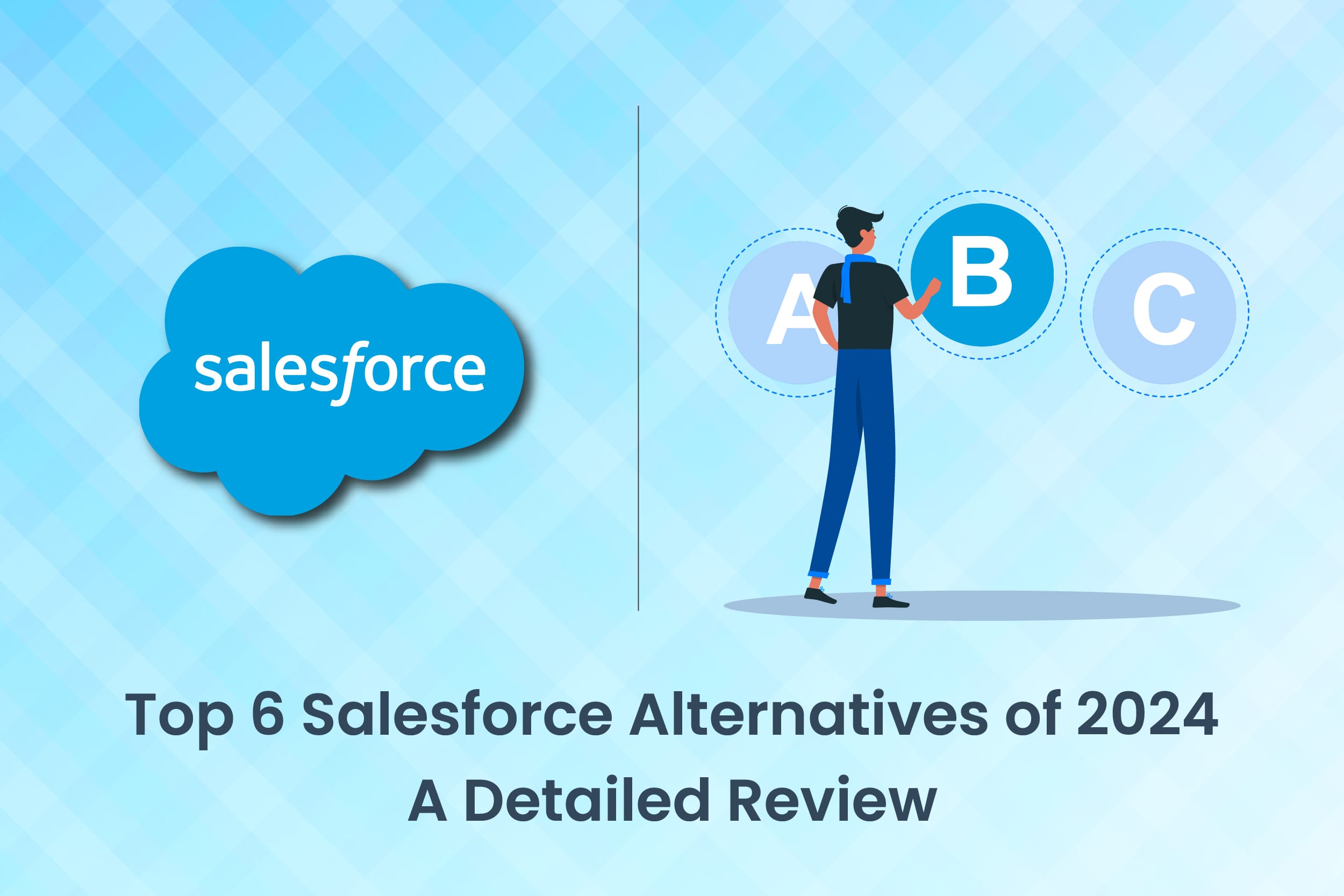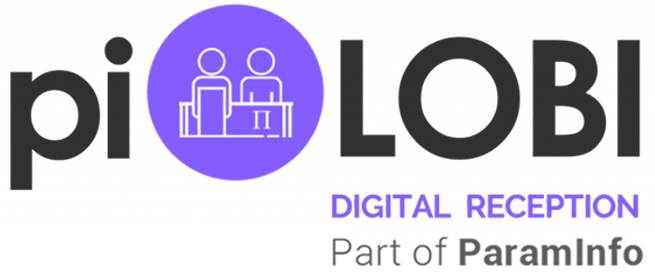
Top 6 Salesforce Alternatives of 2024: A Detailed Review
When considering CRM tools, Salesforce is often the first name that comes to your mind. However, it’s not the only option available, especially in 2024. For any growing organization, having visibility into sales data is crucial. Cloud-based CRMs, like Salesforce, have become essential for businesses to oversee their interactions with potential leads and existing customers.
CRMs differ significantly in price and functionality, so it’s important for organizations to choose one that fits their specific needs and budget. While Salesforce is a popular choice, it may not be suitable for everyone.
Some businesses need a robust solution like Salesforce, while others might prefer a more affordable tool or salesforce alternatives that covers the basics, such as pipeline management and data tracking.
In order to assist you in making a well-informed choice, we’ve gathered a list of the 6 best Salesforce alternatives in 2024. Each alternative is evaluated based on key features and independent reviews, allowing you to find the best tool for your business needs.
However, before knowing the best Salesforce alternatives, let’s understand first what a Salesforce is.
What is Salesforce?
Salesforce operates as a cloud-centric platform for managing customer relationships (CRM) designed to help businesses connect their sales teams with customers, leads, and prospects. Functioning as the ultimate authority, Salesforce allows organizations to track customer interactions and sales data all in one place.
The platform offers numerous features to streamline tasks through automation and personalized workflows. It can be tailored to meet your team’s specific needs with customizable dashboards and extensive integrations, enabling the use of existing work tools.
Despite Salesforce’s robust capabilities and its strong association with CRMs, it might not be the ideal solution for every team. There are several other CRM alternatives available with similar or unique features, which we will explore in this article.
Microsoft Dynamics
Microsoft Dynamics is a prominent player in the traditional CRM space, developed by one of the world’s top five most valuable companies.
Microsoft Dynamics 365 comprises a comprehensive suite of tools designed to handle nearly every aspect of business management, including customer relationship management. For businesses that depend on Microsoft products like Word, Excel, and Outlook, Microsoft Dynamics offers seamless integration, making it an excellent choice.
Similar to Salesforce, Microsoft Dynamics, which is one of the best salesforce alternatives for small business, Offers a comprehensive perspective on your customer base and sales journey. Key features include predicting customer intent, enhancing lead generation and qualification, and strengthening customer relationships.
The sales manager function offers enhanced visibility into your team’s performance with forecasting tools, sales insights, and KPI tracking. Meanwhile, the sales operations’ function emphasizes results by streamlining operations through automated sequences, customized dashboards, and visualizations.
Advantages
Integrations – The application supports integration with the entire Microsoft suite, as well as over 1,000 external applications.
Up-to-date analytics – Collect and analyze data to keep your sales team informed and current on customer journeys and more.
Adaptable – Microsoft Dynamics CRM is compatible with legacy systems, ensuring a smoother transition. Additionally, it can be tailored to suit your particular security requirements.
Limitations
User Experience – Being an older and more complex system, it may not be the most user-friendly and can present a learning curve for many users.
Customization – While Dynamics 365 offers customization capabilities, some users have noted limitations in the extent to which it can be customized.
Pricing
Starts at $65 per user, per month
Pipedrive
Pipedrive is a robust sales CRM and pipeline management platform designed to help teams effectively manage the entire sales process. From tracking deals to optimizing communications, Pipedrive provides comprehensive pipeline oversight.
Compared to Salesforce, Pipedrive is a more cost-effective CRM solution, specifically built by sales teams for sales teams. Since its founding in 2010, Pipedrive has grown to serve over 100,000 customers worldwide.
Pipedrive offers an extensive range of features expected from a top-tier CRM, including seamless integration, lead and team management, insightful data analytics, and workflow automation. This complete suite of tailored CRM tools is designed to accelerate your business’s growth objectives.
While Pipedrive supports numerous integrations through Zapier, it also offers native integrations with several popular sales tools:
- Zoom
- Slack
- Gmail
- Microsoft Teams
Advantages
Efficient Pipeline Management: Pipedrive simplifies pipeline management by enabling users to effortlessly create and monitor multiple pipelines. Whether on desktop or mobile, tracking deals as they progress becomes seamless and straightforward.
Intuitive Design: Pipedrive’s user-friendly design is highly intuitive and accessible. Users often find it easy to navigate, making the CRM simple to implement and onboard the team.
Ease of Use: With its drag-and-drop functionality, Pipedrive makes it effortless to maneuver deals between different stages, update progress, and keep a close eye on overall performance. This simplicity enhances productivity and ensures smoother workflow management.
Limitations
Restricted Advanced Customization: While Pipedrive provides basic customization capabilities, its advanced options are somewhat limited. This may require users to devise workarounds for more intricate sales processes, potentially complicating workflow.
Mobile Application: Users have reported occasional performance issues with Pipedrive’s mobile app, along with Accessing certain features on the mobile version may be less intuitive than on the desktop version. This disparity in functionality may hinder user experience on mobile devices.
Sales-Centric Focus: Pipedrive primarily focuses on sales and pipeline management, which means it may lack some of the marketing automation features available in other CRMs like HubSpot. This limitation could impact businesses seeking a more comprehensive solution for both sales and marketing activities.
Pricing
Pipedrive offers various pricing tiers, commencing from with the essential plan at $14.90 per user. They have five pricing tiers in total, with the highest-tier plan starting at $64.90 per user. It’s important to note that certain features may require additional payment regardless of the selected plan.
HubSpot
HubSpot Sales Hub is HubSpot’s dedicated sales CRM, designed to integrate marketing, sales, content management, and customer service into one cohesive platform. This is achieved through various ‘hubs’ or tools, which can be purchased individually or combined, depending on your business requirements.
As a market leader with a 35% market share in the CRM industry, HubSpot has grown significantly since its founding in 2006, now serving over 194,000 customers across 120 countries.
HubSpot’s standout features include email marketing, ads software, marketing analytics, and 24/7 support, all housed within an exceptionally user-friendly interface.
Given its comprehensive offerings, it’s no surprise that HubSpot is Salesforce’s main competitor.
Advantages
Simplicity: HubSpot’s all-in-one approach makes it an excellent choice for small to medium-sized businesses prioritizing a user-friendly experience. Customers frequently commend the platform for its ease of use.
Automation: HubSpot’s latest AI features such as an AI Email Writer and Social Caption Generator, make it ideal for smaller companies. enhancing efficiency and productivity.
Sales and Marketing Alignment: HubSpot, which is one of the best Salesforce competitors, excels in making data easily accessible and comprehensible for both sales and marketing teams. This makes it suitable for smaller companies looking to enhance overall performance through better alignment between these departments.
Limitations
Ease of Setup: While HubSpot offers a comprehensive set of features, some users have noted that it takes time to adapt to and set up the platform correctly. This initial setup period might delay the realization of the product’s full value for your company.
Integrations: Despite offering over 1,000 integrations, users have noted that HubSpot’s integrations are not always as refined as they could be. Many users resort to workarounds or additional tools to achieve seamless integration.
Pricing Model: HubSpot’s tiered pricing model includes many features behind a paywall, which has led to frustration among some small business users who encounter these ‘hidden costs.’
Pricing
Pricing: HubSpot’s pricing plans specify a fixed cost for a certain number of users within a particular hub. For instance, their Sales Hub is priced at $396 per month for up to 5 users. However, these costs rise as you add more users or incorporate additional hubs, such as the Marketing Hub.
Zoho CRM
Zoho CRM positions itself as a solution tailored to the needs of mid-scale to large-scale enterprises. However, it also offers a free version that serves as an excellent entry-level CRM for small businesses, with the option to upgrade to a paid plan as needs grow.
The paid plan includes advanced features like marketing automation and customer data tracking. Popular functionalities include contact management, sales funnels, pipeline management, and workflow automation.
Additionally, the paid version of Zoho CRM provides integrations with over 500 popular business applications, creating a comprehensive business system. This includes third-party apps such as Mailchimp, Google Analytics, and QuickBooks.
Advantages
Free Plan: One of the standout benefits of Zoho CRM is its free version, which is particularly appealing to small businesses with lower sales volumes and limited budgets.
Mobile App: Zoho CRM offers a mobile app, allowing you to track your data on the go. Even with the free plan, you can connect to other Zoho apps, enhancing your mobility and integration.
Intuitive Interface: Zoho CRM is designed to be user-friendly and easy to learn. All plans include features such as contact list creation, lead generation with drag-and-drop forms, and customization options, making it accessible and efficient for users at all levels.
Limitations
Limited Plan Options: Lower-tier users encounter several restrictions, including limitations on the number of users and access to certain features. Additionally, AI tools are only available on the higher-tier plans.
Customer Support: Many users have noted that customer support is often not very helpful when dealing with integrations involving third-party apps, which is important to consider.
Processing Power: Zoho CRM may not be the most powerful option available, with limitations on the amount of data it can handle. This could be a significant drawback for larger businesses with extensive data processing needs.
Pricing
Zoho CRM offers a free plan, with paid plans starting at $14 per user/per month and going up to $40 for the most comprehensive package. This makes it an excellent choice for those on a budget or those just beginning to explore the CRM market.
Monday.com
Monday.com, traditionally known as a project management tool, has recently ventured into the CRM space with the launch of Monday Sales CRM in August 2022. Project management, contact management, real-time sales dashboards, and lead and deal management are the main topics of this new update.
As a cloud-based platform, Monday.com has always excelled at helping organizations establish workflows, manage teams, and track projects across the company. It effectively unites different departments, providing enhanced visibility into ongoing projects in real-time.
When adapted into a CRM, these capabilities become even more powerful. Monday Sales CRM is a fully customizable sales platform that allows users to track deals, manage pipelines, centralize client communication, and view critical data through intuitive dashboards.
This CRM is ideal for teams seeking a lightweight, user-friendly sales solution. However, it doesn’t offer the extensive large-scale capabilities found in platforms like Salesforce or HubSpot.
Advantages
User Experience: Monday.com is renowned for its user-friendly interface, accessibility, and intuitive design, which extends to its CRM offering. Users frequently praise the platform’s ease of use and quick adoption rate.
Integrations: Despite being a smaller CRM, Monday.com offers an impressive range of over 200 integrations, often facilitated through third-party services. These include popular applications such as Slack, Google apps, and Meta apps.
Cost: Monday.com is a cost-effective alternative to Salesforce, with transparent pricing and minimal hidden costs. This makes it an excellent choice for smaller and scaling businesses.
Limitations
Lightweight Solution: Monday.com is considered a lightweight CRM, which means it may not offer the extensive capabilities found in larger CRMs like HubSpot, Salesforce, or Pipedrive.
Features: One area where Monday.com falls short is in advanced marketing features, such as mass email sending and tracking. As a result, its functionality may be more limited to sales-oriented use cases compared to other alternatives to Salesforce.
Bugs: Some users have reported encountering bugs on the platform, with issues like screen freezing requiring them to log in and out to resolve. While this may be attributed to early-stage issues, it’s worth noting for potential users.
Pricing
Monday Sales CRM offers a basic plan starting at $10 per user, with enterprise plans available on a custom basis. Overall, users appear satisfied with the pricing structure.
SalesLoft
Salesloft stands as an AI-powered revenue workflow platform dedicated to empowering sales professionals and teams to drive greater profitability. Positioned as a comprehensive solution, Salesloft offers a suite of tools designed to streamline digital selling tasks, foster meaningful connections with buyers, and leverage data-driven insights to secure deals.
With a robust set of features, Salesloft specializes in various aspects crucial to sales success. From precise sales forecasting and efficient lead management to dynamic sales acceleration and meticulous sales tracking, Salesloft covers the entire spectrum of sales activities. Moreover, its capabilities extend to sales automation, call recording, cold emailing, and comprehensive sales training, ensuring sales teams have everything they need at their fingertips.
At the core of Salesloft’s offering is its customer engagement platform, facilitating seamless interactions with prospects and clients alike. With a rich ecosystem boasting over 100 integrations, including a seamless connection with Salesforce, Salesloft empowers teams to enhance their productivity and efficiency in driving revenue.
Advantages
Sales Engagement: With a steadfast commitment to the sales journey, Salesloft excels in keeping sales representatives fully engaged throughout the process.
Scalability: Salesloft’s high degree of customization ensures adaptability to the requirements of both small and large sales teams, rendering it a versatile solution suitable for businesses of all sizes.
Analytics and Reporting: Salesloft provides invaluable data-driven insights, empowering sales teams to monitor performance closely and derive informed decisions from comprehensive analytics.
Limitations
Price: A number of people have pointed out that Salesloft might be more expensive, especially for startups or smaller companies.
Complex Features: Some businesses, particularly those with simpler sales processes, find certain features of Salesloft to be overly intricate for their needs.
Customization Constraints: Despite its high level of customization, Salesloft may encounter limitations when attempting to tailor the platform to exceedingly specific requirements.
Pricing
Salesloft’s pricing information is not readily available on its website or G2, but user reviews suggest it falls on the higher end of sales automation software.
So, What is the Best Salesforce Alternative?
The ideal Salesforce alternative is the one that aligns most closely with your team’s requirements. Given the diverse nature of CRM solutions, there isn’t a universally perfect option. It’s crucial to assess your business needs thoroughly before deciding on a platform. While all the CRMs or say salesforce competitors list mentioned above offer strong capabilities, not every option will suit every business. Therefore, it’s essential to choose wisely based on your specific needs and preferences.




